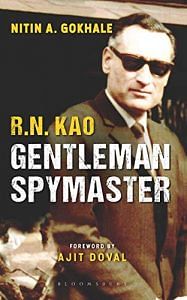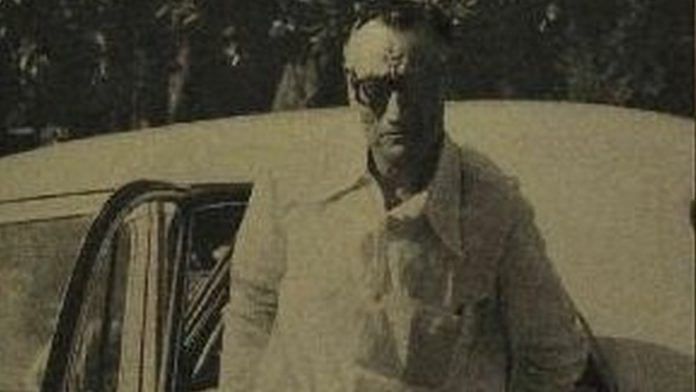Having RN Kao set up ARC [Aviation Research Centre] and headed it until 1966, R.N. Kao [RNK] was also the head of external intelligence in the IB [Intelligence Bureau].
[Lal Bahadur] Shastri had died in January 1966 and Indira Gandhi, Nehru’s daughter, became India’s third Prime Minister. At that point in time, she was considered a political lightweight and the Congress Party stalwarts, who helped her ascend to the top post, had hoped to control her from the shadows. Within a couple of years, however, she outwitted most of her seniors in the party to rule India for over a decade. She had the ability to pick the right team and then leave implementation of her policies to them.
One key appointment she made in 1967 was P.N. Haksar. A Kashmiri Pandit, who had never lived in Kashmir, Haksar, along with RNK, was to play a seminal role in most of Indira Gandhi’s momentous decisions between 1967 and 1975. Haksar, in his capacity as secretary to the prime minister, in fact helped RNK to create R&AW.
There are many reasons cited in public domain why R&AW was created. However, in absence of any official document in public domain on the subject, we will never know the exact reasoning given by RNK in a detailed note to Mrs Gandhi in late 1967 or early 1968. That background note is still classified.
Sankaran Nair, RNK’s closest friend and colleague, has, however, written a longish passage in his book as to why and how R&AW came into being. Nair’s contention in his book is based on his personal knowledge and memory. He wrote, ‘As often happens with bureaucracy, the right hand does not know what the left hand does. Sometimes it cuts its nose to spite the rivals’ face, in the course of turf wars.’ Nair was referring to what he calls a minor conflict that had erupted in 1965 between the army and the Bureau over intelligence turf immediately after the war with Pakistan.
Apparently, Army Chief General J.N. Choudhry sent a strong paper to the minister of defence, Y.B. Chavan. His main point was that the Army could not land a decisive blow on Pakistan because precise intelligence was not available since collection of intelligence was entrusted to ‘flat-footed Çlouseaus of the IB’. The paper argued that military intelligence should be the preserve of military men who should be posted abroad in Indian missions abroad to collect information, replacing the IB representatives. Defence Minister Chavan agreed with these views but the cabinet did not pursue the matter at that time.
When Mrs Gandhi took over as the prime minister, there were many seniors in her cabinet who had longer administrative and political experience. To stamp her authority, Mrs Gandhi had to take many steps to rein in many Congress stalwarts. Nair said that one of those leaders who was cut to size by Mrs Gandhi was Chavan, the strongman from Bombay. Chavan had moved from defence to the home ministry in Mrs Gandhi’s cabinet. The Ministry of Home Affairs (MHA) was the controlling authority of the IB then, as it is now.
Also read: Two yrs before 1971 war, RAW’s RN Kao told Indira Gandhi to be ready for Pakistan partition
Nair wrote that Indira Gandhi strongly suspected him (Chavan) of conspiring against her and in 1968, she ordered the Department of Personnel, which was in charge of the administration of the superior civil services like the IAS, the IPS, along with its junior minister of state, should be removed from the home ministry and placed under the prime minister. She then moved the Central Bureau of Investigation (CBI), a powerful police organisation for the investigation of corruption, which could and has been also misused to his political opponents, from the home minister to the Prime Minister. She moved on to weaken the IB by stripping it of its foreign posts, which, among other things, collected important military information abroad.
Nair added, ‘The defence ministry’s 1965 paper on the need to separate foreign intelligence which included military intelligence, from the IB which Chavan had supported, was effectively used to strip the IB of this duty. The prospect of posting abroad was an attraction which had brought good IPS officers from the states to the IB. So this separation of foreign intelligence was meant to impair the efficiency of the IB and therefore its utility to Chavan as home minister.’
Incidentally, nearly 20 years later, during Prime Minister V.P. Singh’s tenure, the army once again raised the issue of allowing it to run clandestine operations from the Indian diplomatic missions abroad, says B. Raman, a senior R&AW officer. ‘After carefully examining the matter, he reiterated the original decision of Indira Gandhi that the army should collect only tactical military intelligence through trans-border sources and should not run any clandestine operation outside the country. However, V.P. Singh removed the restrictions imposed by his predecessors on the depth up to which it could run the trans-border source operations from the Indian territory.’
Nair remembers that Mrs Gandhi commissioned RNK to produce a paper delineating the structure of the new foreign intelligence agency. He added, ‘Kao, now a Joint Director in the IB, was rated as a top-notch officer. Having worked as the personal security officer to Pandit Nehru, he was known to the family. Being a Kashmiri Pandit was no disqualification either.’ Prime Minister Indira Gandhi had given him a free hand except for two conditions.
Firstly, the new organisation should be a multidisciplinary one and should not draw its higher personnel exclusively from the IPS. Secondly, the top two posts would be filled at the discretion of the prime minister from within the organisation or from outside. Nair, who many old timers of R&AW describe as RNK’s alter ego, wrote, ‘Within a few months, Ramji produced his magnum opus, defining the proposed structure of India’s CIA. The designation of the personnel was to be in secretariat terms. The Chief was to be a Secretary and the junior ranks were to run down the line to the rank of Under Secretary.’
Nair claimed that the then Cabinet Secretary, D.S. Joshi, suggested that the organisation be called R&AW in order to camouflage it and be attached as a wing of the Cabinet Secretariat. Vappala Balachandran, who worked with RNK from 1975 but had a closer association with him in his post-retirement years, says the raison d’être of R&AW was to be different from the Central Police Organisation.
‘R&AW was always clear about the need to keep the organisation away from the police culture. I am extremely proud to be an IPS officer but when I joined R&AW and stayed on, I realised why Mrs Gandhi had emphasised to Kao the need to recruit R&AW officers from the market, if necessary. Intelligence collection, especially foreign intelligence collection, is a completely different cup of tea. Unlike the police or the IB, there is no support system abroad. One has to live by one’s wit and be as inconspicuous as possible,’ said Balachandran, who had several key foreign postings abroad.
Raman, one of the rare R&AW officers to have written extensively about the organisation’s functioning, its successes as well as failures, notes, ‘When the organisation came into being, Indira Gandhi gave it many special dispensations, such as exempting it from the purview of the Union Public Service Commission (UPSC) in matters of recruitment and promotions, powers of sanction of foreign tours, etc. The head of the R&AW wore two hats. As the head of the organisation, he used to send proposals for director recruitment, sanction of posts, foreign travel, etc. to the Cabinet Secretariat. As a Secretary in the Cabinet Secretariat, he had these proposals examined and sanctioned. The idea was that if the R&AW was to be effective as an external intelligence agency, it should not be subjected to the usual red tape.
The grant of these special dispensations demanded that the head of the R&AW exercised these powers objectively with a deep sense of responsibility.’
Nair, who had worked very closely with RNK and had, in fact, succeeded him in Ghana, was asked by Kao if he would join him in building a new organisation that Indira Gandhi had sanctioned. He describes the circumstances under which he agreed to join R&AW. ‘The Prime Minister had accepted Ramji’s paper and asked him to help the new organization which he had started building. He invited me for lunch one day, explained the developments in the matter and said, “Shanks, will you join me in this task? I know the new boss of the IB has denied you your rightful promotion. I’ve not got an equivalent rank in the organization, but I shall try my best to get it for you.” I replied yes. I would love to join you in the pioneering job as a close friend and colleague. To hell with the rank.’ It was, perhaps, one of the most important the two old friends and colleagues would have had over lunch.
Also read: What Indian politicians, bureaucrats and military really think about each other
RNK and Nair made a formidable combination and nurtured the R&AW in its formative years to make it one of the best intelligence outfits in the world. However, from very early of its existence, the R&AW was a victim of bureaucratic apathy and peer jealousy.
 This excerpt from Nitin A. Gokhale’s book RN Kao Gentleman Spymaster has been published with permission from Bloomsbury India.
This excerpt from Nitin A. Gokhale’s book RN Kao Gentleman Spymaster has been published with permission from Bloomsbury India.




On a visit to India, QE II was travelling in an open car, R N Kao with her. Someone threw a bouquet from a balcony, in welcome. In a trice, Kao caught hold of it, unsure what it might be. Oh, well caught, sir. Good cricket, she exclaimed.